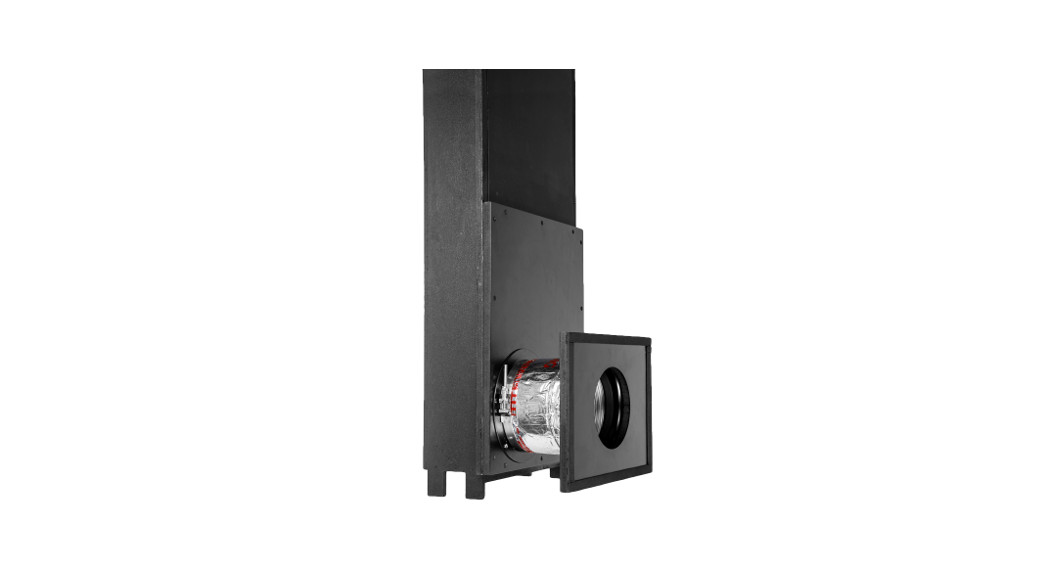 Owner’s ManualS90i / S90 basic-port / S90-f/cHigh Output RTL®Subwoofer
Owner’s ManualS90i / S90 basic-port / S90-f/cHigh Output RTL®Subwoofer
DOCUMENT CONVENTIONSThis document contains general safety, installation, and operation instructions for the Wisdom Audio S90 Subwoofer. It is important to read this document before attempting to use this product. Pay particular attention to:WARNING: Calls attention to a procedure, practice, condition, or the like that, if not correctly performed or adhered to, could result in injury or death.CAUTION: Calls attention to a procedure, practice, condition, or the like that, if not correctly performed or adhered to, could result in damage to or destruction of part of or the entire product.Note: Calls attention to information that aids in the installation or operation of the product.
Introduction
Congratulations on purchasing your Wisdom Audio in-wall subwoofer. The S90’s Regenerative Transmission Line TM technology delivers tremendous bass performance in terms of depth, dynamics, and distortion resulting in articulate bass that integrates seamlessly with high-resolution main speakers such as Wisdom Audio’s Insight or Sage Series.This manual focuses on the S90 subwoofer itself. In order to fully understand the system, we recommend you also review the manual for the SC-2/3 System Controller, or SW-1 subwoofer amplifier, or MiniDSP-1 subwoofer processor, without one of which this subwoofer will not perform correctly.While we expect your local Wisdom Audio dealer to take care of the setup and calibration of the system, we still recommend that you at least briefly review this and the other manuals to understand the system’s full capabilities.
Overview
Your Wisdom Audio S90 subwoofer uses a modern implementation of an old idea for high-quality, low distortion bass reproduction. While the roots of the Regenerative Transmission Line TM go back to the 1950s, it is the combination of modern computer modeling and the vastly more powerful motors of contemporary driver design that make the RTL TM so special.There is a class of bass enclosures that have been around since the 1950s, which can be described generically as “low frequency tapped waveguides” or “tapped pipes”. It was an idea that was a bit ahead of its time then since fully optimizing its use required both powerful drivers and computer modeling. But, if you are into such things, check out US Patent 2,765,864 (filed in 1955), and an AES paper published in 1959, “Analysis of a Low-Frequency Loudspeaker System”.We have utilized sophisticated modeling software in order to fully optimize our enclosures and have developed drivers that are specifically optimized for this application. We call our unique implementation of this relatively old idea a “Regenerative Transmission LineTM ” subwoofer, or “RTL” sub for short.All dynamic drivers develop energy on both sides of the diaphragm, with the rear energy being 180° out of phase with the front energy. If you allow the driver to operate in free space (no enclosure), the front and rear energies largely cancel each other out — especially at low frequencies.
Overview (continued)In our Regenerative Transmission Line TM subwoofer, the energy from the backside of the driver is sent along a long, folded path in such a way that its lowest frequencies arrive back at the front side of the driver in phase, effectively summing to an increase of 6 dB in output. Thus, the energy from both sides of the woofer cone is used in a productive way, resulting in a substantial reduction in distortion and an effective surface area double compared to what you would otherwise expect. As an example, the effective radiating surface area of the two 5”x7” woofers in the S90 is equivalent to a 12”-13” woofer in more conventional enclosures.The results are quite stunning. Low frequencies are strikingly dynamic and responsive and integrate quite seamlessly with the fast and detailed Sage Series planar magnetic hybrids. As an example, the S90 has an output in excess of 123 dB at 20 Hz.Unpacking the S90The Wisdom Audio S90 subwoofer is a substantial piece of equipment. Please exercise caution when unpacking your S90 to ensure that you do not strain yourself from its (perhaps unexpected) weight.CAUTION:Do not attempt to lift your S90 by yourself. Unpacking this subwoofer is clearly a two-person job. It is unwise for a single person to attempt doing so.Do not attempt to lift your S90 while bending or twisting from the waist. Use your legs for lifting, not your back.Always stand as straight as possible and keep the S90 close to your body to reduce strain on your back.
There are three different types of the S90 Subwoofer. Below is a description of the types of installations each one is used for, and what comes with each type.
S90This version (i) is used when you are needing the S90 to have an exposed grille
- (1) S90 Enclosure
- (1) White Grille
- (1) Uni-grip frame
- (1) Port reduction plate
S90 basic-portThis version (basic-port) is used when installing the S90 behind the fabric and a grille is not needed
- (1) S90 Enclosure
- (1) Port reduction plateS90-f/cThis version (f/c) is used when installing the S90 in a remote location up to 24” away from the room, it will be vented into.
- (1) S90 Enclosure
- (1) HVAC Grille
- (1) Extension Hose
- (1) Mounting Plate for S90
- (1) Mounting Plate for Wall
- (2) Hose clamps
- (1) Roll of heavy rubber tape
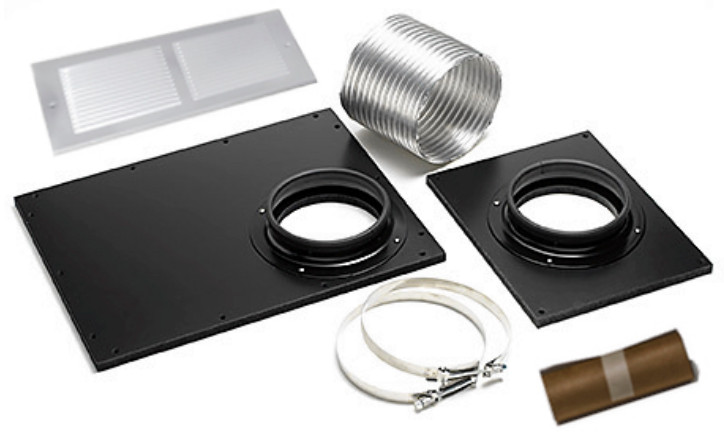

Subwoofer PlacementSubwoofers offer somewhat greater flexibility in placement since the frequencies they reproduce are not readily localizable by the human ear. This is due to the fact that the wavelengths they reproduce are more than ten feet (3 meters) long, but our ears are located only about 6-7 inches (17 cm) apart. Thus these extremely long waves do not contribute meaningfully to the imaging that the main speakers create.However, this fact does not mean that the placement of the subwoofers has no effect on the sound quality in the room. Far from it. The subwoofers are the most likely to suffer from the response irregularities introduced by the room itself, operating as they do below approximately 80 Hz in most systems.For the best location(s) we recommend contacting us directly at [email protected] and we will run a subwoofer analysis on your room to help find the absolute best placement for each of your subwoofers.
Room TreatmentRectangular rooms have six reflecting surfaces (four walls, ceiling, and floor) that reflect sound to the listener, after various delays introduced by the indirect routes the sound take on their way to the listener. These first reflections are particularly damaging to sound quality. Looking at the simplest case of stereo reproduction, you have a minimum of twelve first reflection points in your room that deserve some attention.Unfortunately, it is often difficult to do much about the ceiling and floor reflections, even though they are arguably the most destructive. (The minimization of these reflections is one of the strongest arguments for the tall, line source loudspeakers that Wisdom Audio builds.) This leaves you with eight “first reflections” that you should consider minimizing somehow. These points are easily found by having an assistant slide a small mirror along the four walls of the room, while you sit at the listening position. Any place on the wall where you can see a reflection of any speaker is a first reflection point. Concentrate on the first reflections for the Left and Right speakers first.If you can, arrange to apply either absorption or diffusion at these eight points (don’t forget the wall behind you). Absorption can be as simple as heavy, insulated drapes; diffusion can be provided by a well-stocked bookcase with books of varied
Room Treatment (continued)sizes. Alternatively, you can buy purpose-designed room treatments (some sources listed under References, below).The important things to remember are these: a good room should have a balance of absorption and diffusion, and if you are going to treat only a few areas of the room,the first reflection points are the most important ones to treat.Professional Acoustic DesignDoes this all sound too complicated? For good reason: it is complicated.The difference between the average listening room and one that is professionally designed and implemented is huge. A great listening room will disappear to an astonishing degree, letting the experiences captured in your recordings speak to you directly. A well-designed room is also quieter and more comfortable. It can easily become a favorite retreat for peace and rejuvenation.If you decide to investigate the possibility of improving your room with the help of a professional, it is important to find someone who focuses on residential spaces.Most acousticians are trained to deal with large spaces — airports, auditoriums, lobbies in commercial buildings, etc. The problems seen in “small” rooms (residential spaces) are quite different, and outside the experience of most acousticians. Find someone who specializes in and has a great deal of experience designing home studios, home theaters, and the like. Your Wisdom Audio dealer may be such a person; failing that, he/she can help you find such a professional.ReferencesBooks on Acoustics:The Master Handbook of Acoustics, F. Alton Everest, TAB BooksSound Reproduction: The Acoustics and Psychoacoustics of Loudspeakers andRooms by Dr. Floyd Toole, Focal Press
Installing the S90 in a WallYour dealer has extensive knowledge of wall construction and will customize these installation instructions to suit the needs of your particular situation. But these notes provide an overview of the process.Note that the Regenerative Transmission Line opening that vents the low frequencies into the room may be placed either up near the ceiling or down near the floor. In most rooms, these are largely equivalent positions in terms of acoustics. The difference will usually be aesthetic rather than performance-based.As seen from above, a cross-sectional view of the S90 as mounted in a typical 2 x 6 stud wall looks like this: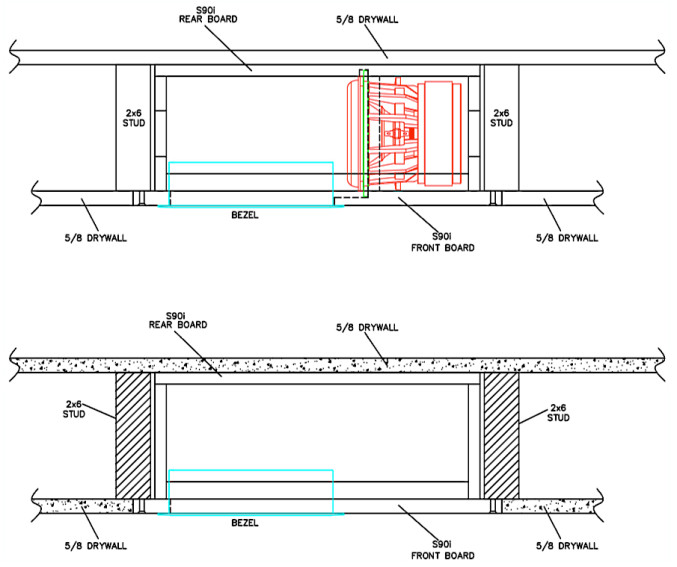

The front board of the S90 is made from 5⁄8” MDO plywood, which presents a smooth, paintable finish surface similar to drywall. It can be butted up against the 5⁄8” drywall, taped, and spackled, and painted like any other section of wall. It will also readily accept skim-coating if the construction calls for plaster walls.
Installing the S90 in a Wall (continued)The process of installing the S90 in a standard stud wall is quite straightforward.
- Open the 2 x 6 stud bay to be useda. The existing drywall (if any) should be cut back so it covers about half of the 2 x 6 on each side of the bay. The flange of the front board of the S90 will cover the other half. Obviously, there cannot be any plumbing or wiring in this stud bay, nor firebreaks. The S90 will use virtually all of the available space in a standard 8’ 2 x 6 stud bay.
- Stand the S90 in front of the bay in which it will reside; make the electrical connectionsa. There are two methods commonly used for making these connections.b. If you have access to the adjacent stud bay, drill a hole through the 2 x 6 stud between where the S90’s feet will be when it is in place, and feed the pigtail through the hole. You can then make the connection in the adjacent stud bay, where you will have plenty of room to work. You can even put the connections inside a J-box for future serviceability if you so desire.c. Alternatively, sometimes it works out easier to bring the connecting wire through the top plate or soleplate of the same stud bay in which the S90 is located. If so, the connection can be made in the space between the feet at the end of the S90 with the pigtail. If the signal is coming through the attic and the top plate, the S90 will need to be “upside-down” with its feet at the top of the bay. This places the grille high on the wall, which may be preferred aesthetically (since it can be mistaken as a surround speaker).d. The preferred method for making the electrical connection is to solder the wires together and then insulate the connection with shrink tubing. If this is impractical, use appropriately sized wire nuts and wrap the wire nut connections in black electrical tape to prevent any chance of the connection vibrating loose.
- Stand the S90 in the stud bay, dress the wires so that they cannot rattle, and screw the front board to the studs with drywall screwsa. The S90 has predrilled, countersunk screw holes so standard #8 drywall screws will sit with their heads below the surface, so they can be tapes and spackled without any trace. A total of eighteen (18) drywall screws are used.b. The S90 should be supported or suspended in a manner that does not subject it to twisting or torsional forces that would stress the enclosure.No wooden or metal enclosure should be forced against an irregular surface. If the studs are curved or warped in an installation the installer must insert shims between the S90 front panel and the stud surfaces to avoid such stresses, as would be the case for any in-wall loudspeaker.Installing the S90 in a Wall (continued)
- Tape and spackle the seams
-
After everything has been painted, slice the paint along the edge of the foam plug in the bass vent. Remove and discard the foam.a. The foam plug is there simply to protect the inside of the S90, and particularly the woofers themselves, from being splattered with paint. Once that purpose has been served, it needs to be removed. A sharp utility knife can be used to break any paint that may have leaked into the area.

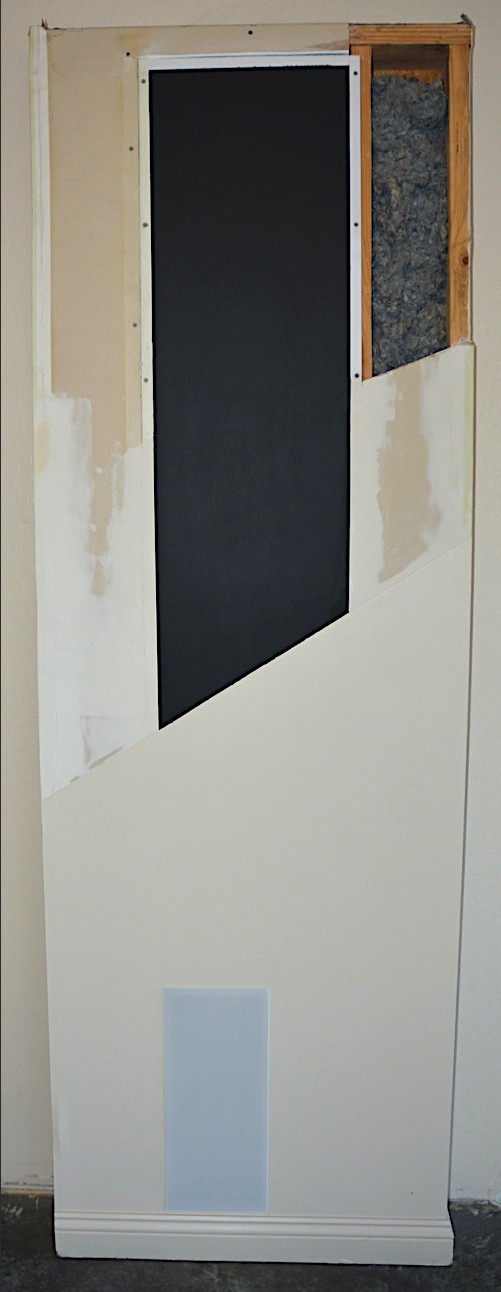
Making the S90 ConnectionsAs with any system, you should make changes to the connections only when the power is turned off to avoid any chance of inadvertently causing a problem (such as a short-circuit).We recommend using heavy-gauge speaker wire, the gauge will vary dependent on your speaker run length. Please consult an authorized dealer to determine what gauge would be best for your application.
Making the S90 Connections (Continued)For the purposes of this manual, we will assume that you have already connected the SC-2/3 System Controller as per the instructions found in its manual. As such, you should have signal coming from your source component(s) to a preamp/processor that provides bass management (to create the subwoofer channel(s), and then on to the SC-2/3; following the SC-2/3, the signal for the sub-woofer is sent to a high-quality amplifier such as the Wisdom Audio SA Series amplifiers.A “pigtail” connection is provided at one end of the S90. Since the S90 fills a standard 2 x 6 stud bay, the simplest thing is to drill a hole in one of the 2 x 6 studs and thread the pigtail through to the adjacent bay, where you have ample room to make connections and run the wires.Alternatively, the incoming signal can be routed directly into the small space provided by the “feet” of the S90, and the connection to the pigtail can be made just prior to installing the S90 in the wall.Connect the outputs of your Wisdom Audio SA-series amplifier to the subwoofer, taking care to get the polarity correct. Connect the positive (+) terminals on the SASeries amplifier to the red wire in the pigtail; likewise, connect the negative (–) terminals on the amplifier to the black wire in the pigtail.
We recommend using wire nuts and then wrapping the resulting connection in electrical tape to preclude any chance of the wire nut working loose over time.
North American WarrantyStandard WarrantyWhen purchased from and installed by an authorized Wisdom Audio dealer, Wisdom Audio loudspeakers are warranted to be free from defects in material and the workmanship under normal use for a period of ten years from the original date of purchase.ImportantWisdom Audio loudspeakers are designed for installation and operation in environmentally controlled conditions, such as are found in normal residential environments. When used in harsh conditions such as outdoors or in marine applications, the warranty is three years from the original date of purchase.During the warranty period, any Wisdom Audio products exhibiting defects in materials and/or workmanship will be repaired or replaced, at our option, without charge for either parts or labor, at our factory. The warranty will not apply to any Wisdom Audio products that have been misused, abused, altered, or installed and calibrated by anyone other than an authorized Wisdom Audio dealer.Any Wisdom Audio product not performing satisfactorily may be returned to the factory for evaluation. Return authorization must first be obtained by either calling or writing the factory prior to shipping the component. The factory will pay for return shipping charges only in the event that the component is found to be defective as mentioned above. There are other stipulations that may apply to shipping charges.There is no other express warranty on Wisdom Audio products. Neither this warranty nor any other warranty, express or implied, including any implied warranties of merchantability or fitness, shall extend beyond the warranty period. No responsibility is assumed for any incidental or consequential damages. Some states do not allow limitations on how long an implied warranty S90 and other states do not allow the exclusion or limitation of incidental or consequential damages, so the above limitation or exclusion may not apply to you.This warranty gives you specific legal rights, and you may also have other rights, which vary from state to state. This warranty is applicable in the United States and Canada only. Outside of the U.S. and Canada, please contact your local, authorized Wisdom Audio distributor for warranty and service information.
Obtaining ServiceWe take great pride in our dealers. Experience, dedication, and integrity make these professionals ideally suited to assist with our customers’ service needs.If your Wisdom Audio loudspeaker must be serviced, please contact your dealer. Your dealer will then decide whether the problem can be remedied locally, or whether to contact Wisdom Audio for further service information or parts or to obtain a Return Authorization. The Wisdom Audio Service Department works closely with your dealer to solve your service needs expediently.IMPORTANT: Return authorization must be obtained from Wisdom Audio’s Service Department BEFORE a unit is shipped for service.It is extremely important that information about a problem be explicit and complete. A specific, comprehensive description of the problem helps your dealer and the Wisdom Audio Service Department locate and repair the difficulty as quickly as possible.A copy of the original bill of sale will serve to verify warranty status. Please include it with the unit when it is brought in for warranty service.WARNING: All returned units must be packaged in their original packaging, and the proper return authorization numbers must be marked on the outer carton for identification. Shipping the unit in improper packaging may void the warranty, as Wisdom Audio cannot be responsible for the resulting shipping damage.Your dealer can order a new set of shipping materials for you if you need to ship your loudspeaker and no longer have the original materials. There will be a charge for this service. We strongly recommend saving all packing materials in case you need to ship your unit someday.If the packaging to protect the unit is, in our opinion or that of our dealer, inadequate to protect the unit, we reserve the right to repackage it for return shipment at the owner’s expense. Neither Wisdom Audio nor your dealer can be responsible for shipping damage due to improper (that is, non-original) packaging.
Specifications
All specifications are subject to change at any time, in order to improve the product.
- Number of required amplifier channels: 1
- Frequency response: 20Hz – 80 Hz ± 2dB relative to the target curve • Impedance: 4Ω
- Sensitivity: 93 dB/2.83V/1m
- Power handling, peak: 1000w
- Maximum SPL: 123dB / 20 Hz /1m
- Dimensions: see appropriate dimensions drawings on next page
- Shipping weight, each: 65 lbs. (30 kg)For more information, see your Wisdom Audio dealer or contact:
Wisdom Audio1572 College Parkway, Suite 164Carson City, NV 89706www.wisdomaudio.com[email protected]Ph: 775.887.8850
S90 Dimensions
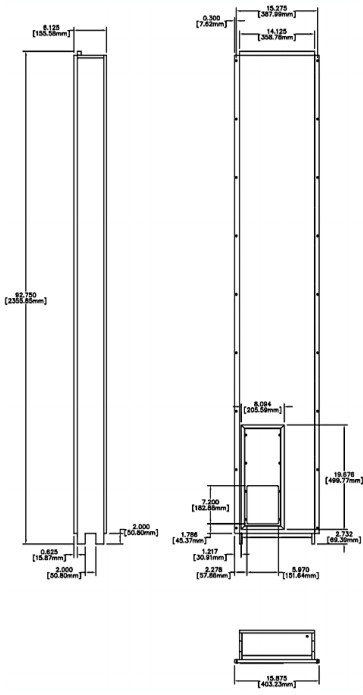




WISDOM and the stylized W are registered trademarks of Wisdom Audio.Wisdom Audio1572 College Parkway, Suite 164Carson City, Nevada 89706 USATelephone: 775.887.8850Fax: 775.887.8820www.wisdomaudio.comS90 OM-6.0 © 5/12/2021Wisdom Audio, Inc. All rights reserved.Printed in the U.S.A.
References
[xyz-ips snippet=”download-snippet”]

